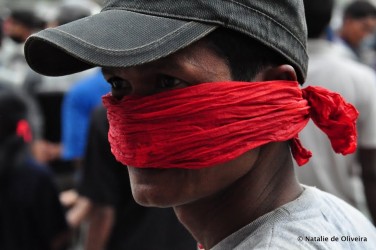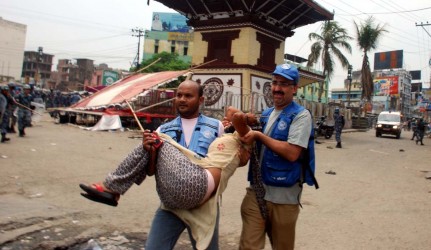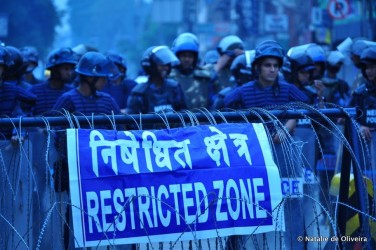We’ve had a bit of a blogging hiatus given the pre-election period in the UK, but it’s nice to be back online! Things with Nepal’s peace process have gone up and down since I last blogged, but unfortunately I don’t really have much positive progress to report.

Last week was a week of strikes and general shut down here. Following huge May Day parades on 1 May when the Maoist party bussed in an estimated 100,000 activists for a day of celebrations and demonstrations, the Maoists imposed a 5 day strike, or bandh, as it is known here.
This means that no schools, shops, businesses or government offices were allowed to open. No motorised vehicles were allowed on the streets – so no cars, buses or motorbikes, but bicycles, ambulances, tourist buses and diplomatic vehicles were allowed. Hospitals and health clinics could open, and embassies and international agencies were allowed to open, assuming that staff could get to work. Not surprisingly, many hospitals and health clinics were virtually shut or offering very limited service.
All DFID Nepal UK staff live close to the office so could get in by bike or walking – no excuses! But many local staff live too far away to be able to even try. Nevertheless, some local staff showed exceptional dedication by cycling or walking over two hours to get to work – very impressive!
We’d stocked up with food and bottled water, so were well prepared as were most Nepalis, but our daughter’s school was closed and our son couldn’t get to his playschool, so along with everything else we had two bored children on our hands!
With an estimated 50,000 Maoist cadres on the streets and masses of Nepal police drafted in, things were pretty tense at times. Although the bandh was primarily peaceful, with admirable restraint shown on both sides, there was still sporadic violence and people were hurt. An estimated 6 Maoists died from various causes.

Businesses were badly affected as both staff and customers stayed away, and farmers threw vegetables away as they could not get them to market to sell. Children missed their school exams, and tourists must have been pretty bored as they couldn’t do anything but wander around pretty empty streets!
I ventured out across Kathmandu at the beginning of the 5 day strike to pick up a friend’s daughter from her lodgings in town so we could help her get to the airport (which we finally did in a UN convoy that was luckily going anyway). It was very interesting. It was at night, just after the Maoist torchlight procession had finished, and there were still large groups of Maoists (mostly young men) wandering round, a few bollards kicked over and some burning tires (I think) in the roads.
But although I felt quite uncomfortable and a bit nervous, the crowds parted to let us – clearly expats – through, and some of the protesters waved at us in a very friendly manner. Quite at odds with the tension we were feeling inside!
The Maoists lifted their bandh last week. My daughter is now back at school and all staff are now back in the office. Things are back to normal. The political parties are still discussing around a possible agreement, but despite optimism by political party members that I speak to, we still have no agreement. Meanwhile the Maoists have vowed to return to the streets on 25 May if there is no progress. Time for the people of Nepal really does seem to be running out…


10 comments
Comment by Suhrid posted on
Great ,,, nicely crafted but i think you have missed information about Peace Rally being carried out and its importance and along with potential clashes between people at the day maoist took the strike back
thanks ..
Comment by Oli Md. Abdullah Chowdhury posted on
Although we live far apart from Nepal, we had felt some heat. We at Sylhet, Bangladesh were expecting an MOU signed by an NGO Alliance office based in Nepal. However, it was taking time due to Bandh. Fortunately, we were informed by the lady from Khatmandhu and we waited for the Bandh to be lifted.
What I have learnt from the post, the problem still remains. If Maoist again takes the street, there would be further escalation of tension. As I had also seen that Maoists resumed military training for their cadres again, the peace process might face a serious blow in the near future. It would not bring any good for the Nepal and the region.
Let good sense prevails and dialog paves the way for negotiating the difference !
Comment by Sarah Sanyahumbi posted on
Suhrid
You are right about the peace rally - it was great to see so many people come out in support of peace and pushing for a resolution! Also good to see the private sector now playing a role in trying to push political parties towards a solution. Let's wish them luck!
Comment by Mochi Sada posted on
Dear Sarah,
Through this article, once again you show your delimma in identifying real problem, solution and your role in supporting peace process in Nepal. You saw the participants and organizer of peace rally (private sector) in support of paece and pushing for a resolution. I agree with you. What about thousands of Maoist supporters who did peaceful demonstration in streets of Kathmandu for six days? I think they also want peace and resolution. Pls do not be bias toward them.
I am wondering why you became so self-centric in later days when blogging. Previously you used to raise problems of Nepali people and you used to define your responsibility toward those people as a head of DFID. Do you think your problem during the strikes represent problem of all Nepali? If you rely on Nepali news channels, then you are wrong. Rural Terai, remote mountains and most of the villages still rely on bicycles, cart and local transportation means. They were affected but not as much as shown in the 21st century news channels of New nepal.
As a good wisher for nepal, your worry on political deadlock is obvious. But be sure, these political leaders are doing drama and in a few days they will come with a new agreement. You expat will be surpirsed and praise these political leaders unanimously. These political leaders are very skillful in preserving their own interest (Bahunbad or Hindu Elitism) as well as interest of you international communities. The only looser of this game will be again most poor and marginalized people, communities.
And this is not new story. It has been on stage since last 240 years. You British people are also on stage since the origination of modern Nepal. We all have been enjoying this drama and be sure you will get many many opportunity to have these.
Just my question is "Madam, Are you also doing drama?"
All the best.
Comment by Siddhartha Shrestha posted on
Sarah, Have you read this interesting parallel between the UK elections and political disturbance in Nepal that was piblished in The Kathmandu Post. I think it was a good read.
http://www.ekantipur.com/2010/05/20/Oped/Doctrine-of-Necessity/314667/
Comment by Stuart Cameron posted on
Hi Sarah
I read somewhere that when there was a bandh in 2009, the organizers were persuaded by the "Schools as Zones of Peace" campaign not to extend it to schools. It sounds like this wasn't the case with the bandh this year. Do you know anything about what efforts were made to keep schools open?
Comment by Laxmi Oli posted on
Hi Sarah
Nice sharing your experience during this period. am bit late to read your comments, however, you have put your view representing other's view and experience as well.
We have closely experienced and watched the situation in Kathmandu, because compared to other parts of the country, Kathmandu seems more secure and less disturbed city. But in fact more than half of the parts of the country experience the similar situation every day, people live with fear, do not feel secure and no one knows what will happen now and then, but at least we did not have to feel non secure, because the demonstration was much peaceful and controlled than it was expected.
But in other parts, there is violent every day, there are several militant and terrorist/rebelians group with several weapen. This is true that maoists have provided the platform and encouraged the criminal minded people and it helps such people to take weapen and help them to develop their confident towards the crime. But in fact they all are not born themselves, they were created by polital parties, for political advantages and tuilities. Still there are thousands of criminals protected by the political parties and as per the news media, the number of such people in Maoist party is much higher than in other parties, but no any leader individually and organisationally are not pure, everyone have protected and provided shelter to such people. But at least we did not have to experience any violence in Kathmandu city and in other parts except some encounter.
This is hapening intentionally. We all know, every people know what is going wrong and how this can be solved, but who gonna take action? who is ready for secrafice, they all know if the situation is solved then their business will be end. I would like to refer to the interview of one of the renouned businessman of Nepal and the member of the Constitutient assembly Mr. Rajendra Khetan, he had quoted that "in business, our primary purpose is doing business and there is bit politics behind our business, but in politice, the main purpose is business and there is MUCH politice behind for better business performance."
You can seethe financial transaction of each political parties? how is this collected? who gave them? they either looted from people, collect forceful donation, or corruption, illegal transaction of probihited goods and donation from INGOs like you and foreign country who work and speak in their behalf.
As youur working station has been Kathmandu for couple of years, i guess you have walked, driven the many parts of the city, but are you satisfied with the basic infrastructure of road, traffic and other facilities? The road damage on the next week they built new road, this is because the only 10% of the proposed budget are utilised in the real project, there is no any sincere and honest regulating authoruty, because all the regulating authority already receive their commissiong from the contractor.
All the beaurocrats, political leaders, their followers, security agencies and other groups are corrupts, every one know this and still you and other INGOs are investing such people.
Organisation like DFID are funding such group of people and this should be monitor effectively by the relevant donators.
Regards,
Laxmi Oli
Kathmandu, Nepal
Comment by binod bista posted on
Dear Sarah,
I couldn't suppress my curiosity after having attended your talk on 6 October during the nepal economic forum third issue release. Listening that the foreign aid agencies have difficulty in identifying or zeroing on "who represents a private sector in Nepal" and the other speaker saying that "anybody with an idea can be considered a private sector" I lost my enthusiasm and purpose of attending that talk program. If the foreign aid agencies truly have a problem with a private sector, then the first thing they need to do is to bring out a criteria based on ground realities that is also workable. Apparently I don't fully blame the agencies for finding it hard to comprehend the identity of a true private sector (Nepal) as it is a blend of part semi-government and part private sector in-the-making. I hope that DFID along with other agencies would be able to grasp and get hold of the real private sector soon for fruitful cooperation and support aimed at the Nepali people. Thanks and regds. Binod
Comment by Binod posted on
Hi Sarah - I'm slightly out of track here and asking about DFID's action on labour migration and remittances. Recent studies (including World Bank, ILO, NLSS/CBS, SDC etc.) claim that
- remittances contributes to more than a quarter of Nepal's GDP;
- there is at least one migrant worker or a returnee in 1 out of 3 households;
- there are scopes of making productive investment of remittances (mostly spent on land/ house and migrating to urban centres);
- there are evidences of exploitation of remittances earners in the whole migration cycle and
- a lot of women are trafficked/ abused during the process of transnational migration
Nepal is one of the top ten countries which has the highest share of remittances in GDP. However, this is difficult to find the actions on migration and development and some actions which are initiated by GoN, IOM, UN Women and other NGOs are mostly Kathmandu centred. In this context, I am pleased to find that DFID has developed its international policy on migration and development, titled 'making migration work for poor people' in 2007 and it works as one of the major development partners in Nepal. As a research student (currently at the Australian National University), I am interested learning about your plan or work on migration in Nepal and would be pleased to get further information. Thank you
Comment by Hans posted on
Fine way of explaining, and nice paragraph to take facts concerning my presentation subject, which i am going to present in school.